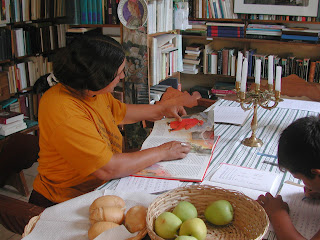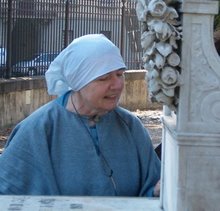
I have taught at all levels, nursery school, junior high, high school, university, graduate students. I see our present economy crashing because we do not educate fittingly. At Princeton I spent many hours talking Julian Jaynes into the writing and publishing of the controversial best-seller The Origin of Consciousness of the Bicameral Mind. Later came holistic thinking in the counter culture, and later still, neuroscience finding Jaynes' concept about the functioning of the brain as true. At present our education, churning out bureaucrats, technocrats, is mechanistic, linear, checking/ticking boxes, rigid. And it doesn't work. Here in Italy young people find no work. And cannot work with their hands, their bodies, while their minds have become a trap. They live with their parents whose pensions support them, and cannot marry and have families, lacking a house, a job.

Our educational system is designed for ivory tower universities, derived from Greco-Arabic misogyny adopted by western crusading Christianity in the twelfth century, out of sync with nature, with humanity. There was an earlier and healthier form. Monasteries and convents used, and still use, the body, the mind, the soul, in self-sufficient but celibate communities, balancing work, study and prayer, the learned genders in the greater span of Christianity having been separate but equal. 'Use it or lose it' is a wise statement. One cannot only be in prayer, or only in study, or only in work. Combining all three keeps all three aspects in harmony, in health.

Accidentally I have discovered that if one has a garden (mine is a cemetery) and a library, the two things Cicero said were needed for happiness, one has the ideal setting for education. We combine the German concept of 'kindergarten', but for all ages, we use Margaret McMillan's early childhood education for those in poverty, Dr Maria Montessori's concept of freedom to explore tanglible surfaces and shapes learning through the body's senses in tandem with the brain, Don Lorenzo Milani's education of the most deprived, Fernando Cardenal/Paulo Freire concept of alphabetization for all ages, and we do this in a library in a cemetery where on Sundays Romanian Roma families come to learn and work joyously.

Just as the irises we plant in this garden multiply and need separating so do the books in this library multiply from its rule that to become a member one gives it a book a year. So, with Progetto Agata Smeralda, we create library schools, with each of seven Roma families receiving an encyclopedia, school books, children's books, an illustrated Dante, Commedia, alphabet sheets, books the Roma themselves write and illustrate in four languages, these going to six mothers and a widow, each receiving a monthly stipend so they do not need to return to Florence to beg, leaving their babies with grandmothers. If they came and begged with their children they would be imprisoned.

Sitting around two tables, the men at one, the women and children at another, for they are very traditional and the women won't allow themselves in a room with men not their husbands, we discuss their poverty, their lack of housing, sleeping in streets in Florence, in camps with mud in Roma, in overcrowded council housing with concrete where children can't play and where TB is rampant, and they suggest the solution, since they are no longer allowed their caravans, could be garden cities, with libraries, with orchestres, with market gardens, with botteghe workshops, families becoming self-sufficient, interdependent, cultured intellectually if not rich materially with unnatural machines of metal and plastic.

So from our Alphabet School I took this proposal to the European State of the Union meeting held in Florence this year:
Debate Question: EU Labour Market and Migration Policy (http://www.umilta.net/Xanadu.html):
Could the European Union in this time of austerity and scapegoating racism restore hope by responding to its EU citizens' needs for work and housing by enabling 'green' garden cities, like Florence's Isolotto, Yorkshire’s Saltaire? With housing and landscaping to be built and maintained in part by EU citizens currently out of work and homeless, including nationals and Roma/Traveller EU citizens, western and eastern EU citizens, working and living side by side? Garden cities that would have space for children to play and learn, with bicycle and bus transportation, workshops for craftspeople and apprentices, vegetable gardens and farmers' markets, libraries and orchestres. Priority for work and housing to be for EU citizens. Non-EU citizens could have dormitories, the right to study, to make and sell artefacts, to grow and sell garden produce, to share their skills with citizens, eventually themselves to achieve citizenship, but not factory or construction work needed by EU citizens. Land could be obtained by raising taxes on abandoned industrial properties, then re-zoned as residential with lowered taxes where 'green' garden cities are being built. One member to be guaranteed work to house, educate and receive medical care for his or her family, achieving this through fair taxation, while reducing EU bureaucracy that currently does not reach its increasingly impoverished EU citizens?
Julia Bolton Holloway, Ph.D. Citizenship: United Kingdom, EU; Residency, Florence

I'm afraid the eyes of Mario Monti and Jose Manuel Barroso just glazed over when I said these words. The left-hemisphere technocrats cannot understand the holistic, natural, human concepts of the right-hemisphere synapses. But it is access to the land we need most for our economy to recover and flourish, the sense of the Commonwealth that Florence and Rome and Athens once had from which came their rich cultural flowering. Money becomes meaningless unless it is anchored to work, study, prayer, in harmony. We need gardens, workshops, libraries. We are not machines, but flesh and blood, marvelously made by our Creator, and needing to be in harmony with Creation.



